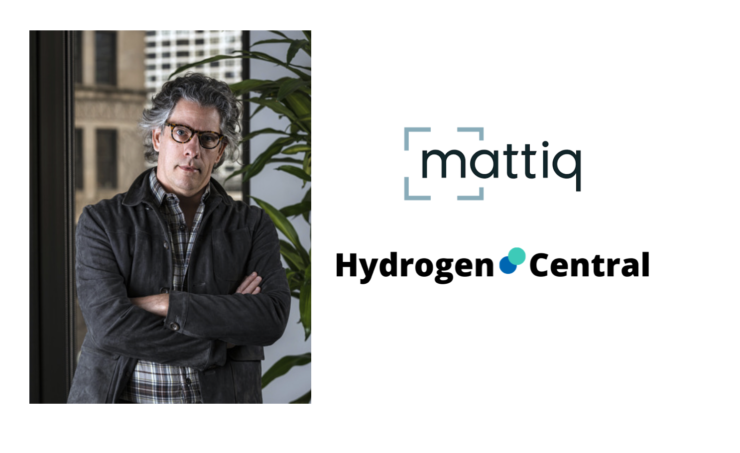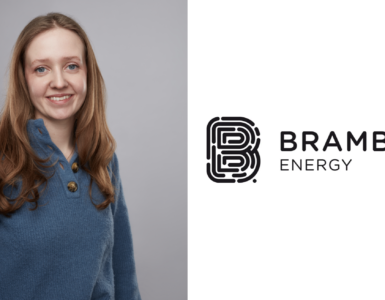How Mattiq uses data and AI to advance the electrolyzer technology, and interview with Hydrogen Central.
Mattiq is a transformative materials design and development company on a mission to decarbonize the fundamental building blocks that power our world. Spun out from Northwestern University, Mattiq blends materials science and artificial intelligence to accelerate the exploration, discovery, and real-world deployment of new materials and processes to power commercially viable, sustainable production of critical chemicals and fuels.
Jeff Erhardt, Mattiq CEO
Jeff Erhardt is a technology leader and entrepreneur with 20 years of experience in artificial intelligence (AI) and material science. Most recently he was Executive Vice President, Intelligent Systems at General Electric, where he led industrial AI efforts following the company’s acquisition of Wise.io, where he was CEO. Erhardt holds more than 30 patents, an engineering degree from Cornell University, and an MBA from The Wharton School of the University of Pennsylvania.
🔥 What about we co-host a webinar? Let's educate, captivate, and convert the hydrogen economy!
Hydrogen Central is the global go-to online magazine for the hydrogen economy, we can help you host impactful webinars that become a global reference on your topic and are an evergreen source of leads. Click here to request more details
- Tell us about Mattiq
Despite major advances in clean power generation and battery technologies, chemical and fuel production remains difficult to decarbonize, directly accounting for ~6% of global CO2 emissions. Powering these processes with renewable feedstocks and electricity, rather than fossil fuel feedstocks and fossil fuel heat, will enable dramatic reductions in CO2 emissions and lead to reduced cost of production.
At present, the value chain for electrochemical process development and deployment is fragmented and siloed, with different companies specializing in discrete products (i.e., catalyst, catalyst-coated membrane, electrolyzer). As a result, holistic optimization of a complex system is inherently slow and inefficient.Mattiq is reinventing materials design in the context of real-world systems, streamlining a historically slow, linear, and fragmented approach to chemical process development.
Enabled by massively parallel experimentation that mimics and miniaturizes real-world systems and turbocharged by data and artificial intelligence, Mattiq uniquely streamlines technical development and partnership ecosystem formation to accelerate commercially viable solutions to market.
The result is the radical transformation of electrochemical process design, development, and deployment, leveraging a closed-loop, end-to-end development pipeline, unifying catalyst development, device integration, and field deployment. Ultimately, we deliver clean, modular, and distributed production of the chemicals and fuels that power the world.
- How does this approach apply to hydrogen production?
The iridium challenge
95% of the world’s hydrogen is currently produced via steam methane reforming (SMR) using natural gas as a feedstock. Hydrogen produced from SMR carries a substantial carbon footprint – and if the CO2 produced during this process is captured and sequestered, this would be known as “blue hydrogen.” However, this adds significant cost and complexity to hydrogen production, opening the door for alternative hydrogen production methods to scale.
The next big wave is to produce hydrogen using only water and electricity – an increasingly cheap and clean resource to power chemical reactions (“green” or “clean” hydrogen). Clean hydrogen is produced through various electrolyzer architectures (i.e., liquid alkaline, proton exchange membrane [PEM] anion exchange membrane [AEM] and solid oxide), with PEM being adopted by major manufacturers including Cummins, Plug Power, Siemens, and Nel.
Electrochemical transformations are driven by electrocatalyst materials, and PEM water electrolyzers rely on both platinum and iridium electrocatalysts. While platinum is a well-known precious metal, iridium presents far greater cost and supply chain risks.
Iridium is extremely rare, and its production is highly concentrated in South Africa, which accounts for approximately 80-85% of the six to eight tons of iridium produced per year (only ~1.5 tons per year are available for electrolyzers – Johnson Matthey).
The balance is produced in Russia and Zimbabwe. With increasing demand, the price of iridium has risen from < $1,000 per ounce in 2017 to approximately $5,000 per ounce today. As PEM electrolyzers used for clean hydrogen production are deployed at scale, prices will continue to escalate. Accordingly, there is an urgent need for the development of novel catalyst materials with reduced or eliminated iridium content, such that clean hydrogen production can achieve scale.
Furthermore, what makes iridium such a good PEM electrolyzer catalyst is its durability in highly acidic environments – accordingly, any alternative will need to match the operational lifetime of iridium. At present, there is no accepted “accelerated stress testing” protocol that can speed up the rate at which new materials are tested and compared against state-of-the-art iridium catalysts. Accordingly, new materials must individually be tested for months or years before end-users will trust their reliability.
The problem with the status quo and Mattiq’s solution
Taken together, considering the number and depth of the experimental variables in a PEM electrolyzer – the ratios of metals in novel electrocatalyst materials, the surrounding chemical environment, the composition of the membrane, etc. – this becomes a nearly infinite design space as we seek to deploy an active, durable replacement for iridium.
The problem is that traditional R&D techniques test, at most, hundreds of systems design combinations per day, and take place within silos along the development process. The result is a slow and inefficient design and deployment of new products.
Mattiq is uniquely suited to solve this key challenge, leveraging combinatorial experimentation at unprecedented throughput. Specifically, Mattiq synthesizes tens of thousands of unique materials per experiment – well-defined nanoparticle alloys of arbitrary but controlled composition – then tests them for their electrocatalytic activity and durability. Coupled with a tight feedback loop with prototype-scale device testing, Mattiq accelerates the optimization of electrochemical systems.
Furthermore, to streamline the commercialization and deployment of these electrochemical systems, Mattiq facilitates partnership ecosystem formation between key players in the value chain, including catalyst-coated membrane manufacturers, electrolyzer manufacturers, and end-users.
Given the massive manufacture and deployment of electrolyzers for green hydrogen, reducing or eliminating iridium content in PEM electrolyzer catalysts is a critical target for the industry. Mattiq is solving this problem with its industrial partners.
- How does this technology work?
1. Expanded pipeline of new materials
Given the quantity of catalyst and system design combinations to investigate, our first task is to dramatically widen the pipeline of materials that can be tested. Mattiq arbitrarily synthesizes combinations of any of the ~35 metals that are relevant to electrocatalysis, in mixtures of 2, 3, 4, or more metals alloyed into a single candidate material.
These nanoparticle catalyst materials are created using a proprietary nanoscale “printing” technique that allows Mattiq to controllably synthesize these materials massively in parallel. Ultimately, Mattiq synthesizes and evaluates tens of millions of novel design combinations per day.
2. Accelerated stress testing
Durability under industrial operation is critical for new catalyst materials within electrochemical systems. Parallelized stress testing of materials on each material library enables Mattiq to pinpoint candidates that will perform best in real-world settings. Iridium replacements, for example, must be able to withstand highly acidic conditions for years of real-world operation.
Subjecting novel catalyst materials to these real-world operating conditions (pH, voltage, etc.) allows for massively parallel durability testing of candidate materials, and the selection of only the most durable for further scaling and testing.
3. End-to-end development pipeline
Mattiq’s scope and capabilities go well beyond initial catalyst discovery – Mattiq scales promising catalyst materials and integrates them into prototype-scale electrolyzer devices to build a tight feedback loop and enable rapid product development. Furthermore, Mattiq builds a partnership ecosystem with industrial manufacturers, enabling performance data collection across scales and rapid deployment of best-in-class electrochemical solutions.
4. Leveraging the World’s Largest Material Performance Data Repository
By 2024, Mattiq will have screened one trillion materials for deployment in real-world systems. The data generated by this work provides critical intelligence for refining and further reducing the time it takes to identify high-performance materials and optimize holistic electrochemical systems in the future.
- You mentioned Mattiq is commencing collaborations with industrial partners to scale. What does this look like?
Building a broad ecosystem of partners is critical to delivering solutions at scale. Not only do we need to integrate the technology development ecosystem, but also analyze downstream needs – including large-scale manufacturing, project development and deployment, and offtakers. Every player has a key role to play, and Mattiq is developing relationships with companies at every stage of the value chain, building a cohesive clean hydrogen ecosystem.
Mattiq has the unique ability to fine-tune and tailor solutions for particular partners. As an example, Mattiq may partner with a catalyst-coated membrane (CCM) manufacturer to co-develop a next-generation water electrolyzer CCM or a CCM that enables a novel electrochemical process (e.g., electrochemical hydrogen peroxide production, ethylene oxidation, CO2 or biomass valorization, etc.).
Mattiq has deep expertise in rapid electrocatalyst discovery, development, and systems optimization within prototype devices, and will work with partners to make the jump to rigorous industrial testing and piloting (bringing in the CCM manufacturer’s customers, the electrolyzer manufacturers, for additional testing), and commercial deployment at scale.
The goal of each partnership is to bring together complementary expertise and capabilities to accelerate best-in-class electrochemical solutions to market at scale, where the end result is fine-tuned to our partner’s capabilities and needs.
- Tell us about your team.
Mattiq combines deep expertise from 3 pillars: 1) industrial chemicals and energy, 2) fundamental chemistry and materials science, and 3) enterprise software and artificial intelligence. Our multidisciplinary team fuses hard science with data and AI and is deeply informed by industrial experience. Mattiq has succeeded in assembling a core team with an unparalleled breadth and depth of expertise – which is absolutely essential to solving the multidimensional challenges faced by the industry.
The company was co-founded by world-renowned material scientist and professor Chad Mirkin, a nanotechnology pioneer who has helped develop more than 2,000 commercial products in life sciences, nanofabrication, semiconductor processing, and more.
Mattiq recently announced veteran Silicon Valley executive and entrepreneur Jeff Erhardt as Chief Executive Officer as well as $15 million in seed funding, led by Boston-based venture capital firm Material Impact. Carmichael Roberts, Co-Founder & Managing Partner at Material Impact, has joined Mattiq’s Board of Directors.
READ the latest news shaping the hydrogen market at Hydrogen Central
Mattiq: Hydrogen Central QA, May 25, 2023








